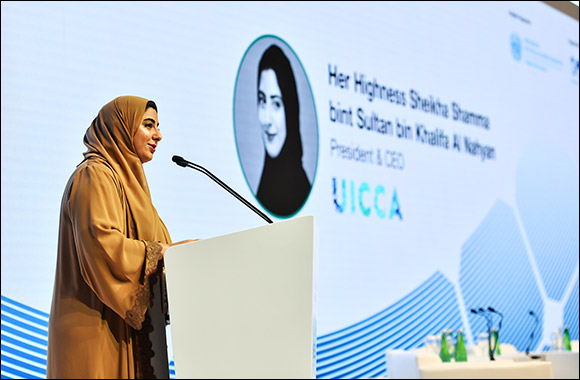- Her Highness Sheikh Shamma bint Sultan bin Khalifa Al Nahyan, president and CEO of the UAE’s Independent Climate Change Accelerators, warns “action cannot take place if we work in silos”
- IRENA’s latest capacity data shows the world is falling short of 1,100GW annual renewable power requirement, despite 2023 marking the largest surge of renewable power generation to date
Abu Dhabi, April 16, 2024: With tempestuous Gulf rains acting as a timely reminder of the need for urgent climate action, the 16th edition of the World Future Energy Summit, hosted by Masdar, opened in Abu Dhabi today with calls for collaborative action to ensure average global temperatures do not exceed that of preindustrial times by more than 1.5 degrees Celsius.
Delivering a keynote speech to open the three-day event at Abu Dhabi National Exhibition Centre (ADNEC), Her Highness Sheikha Shamma bint Sultan bin Khalifa Al Nahyan, President and CEO of the UAE Independent Climate Change Accelerators (UICCA), commended the recent collaborative launch of the Roadmap to 1.5°C by the COP Presidencies Troika, which consists of the UAE and the next two COP hosts, Azerbaijan and Brazil. Sheikha Shamma warned, however, that limiting global climate change to 1.5°C above pre-industrial levels will “require unprecedented finance”.
“We know that effective climate action cannot take place if we work in silos,” said Sheikha Shamma. “Instead, we believe in the power of convening diverse voices to promote dialogue, knowledge exchange, and creative problem-solving. Forums such as World Future Energy Summit offer crucial opportunities for actors from different sectors to exchange views, sparking ideas and collaborative action.
“The UAE prides itself on building bridges to everywhere and I’m so pleased to hear of the COP Presidencies Troika. I am full of confidence that this new coalition will be an important steward on our collective pathway to keeping global warming below the 1.5°C threshold… [yet it] will require unprecedented climate finance.”
As a solution, Sheikha Shamma highlighted the potential of “Blended Finance”, which can be broadly defined as a combination of public concessional finance with public or private capital. The model is being increasingly recognised as a key mechanism to deliver the financial resources needed to fight climate change. A new analysis by UICCA in cooperation with Convergence and HSBC into Blended Finance in the Middle East and North Africa (MENA) found the financial model to be in its infancy, with a total committed financing of US$14.2 billion dollars. Such a figure represents seven per cent of global blended transactions, while climate-related blended transactions amount to roughly US$7bn.
Also speaking as part of the opening keynote programme was Francesco La Camera, Director-General of the International Renewable Energy Agency (IRENA). According to La Camera, priorities for the energy transition and immediate steps to accelerate progress towards tripling renewable power capacity to at least 11 terawatts (TW) by 2030 need to be explored.
Despite 2023 marking the largest surge in renewable power generation to date, IRENA’s latest capacity data shows the world is still falling short with last year’s record 473 gigawatts (GW) some distance off the almost 1,100GW required annually.
“The energy transition is accelerating rapidly, but it clearly remains off track, with an unacceptable and uneven distribution of renewable growth that disproportionately affects the Global South,” said La Camera. “We need an urgent global course-correction to address this growing disparity, or we risk our collective climate goal to triple renewable power capacity by 2030 becoming simply unattainable.”
Meanwhile, addressing the opening of the Green Hydrogen Summit, a Masdar-hosted event running as part of the World Future Energy Summit, the Rt Hon Boris Johnson, former Prime Minister of the United Kingdom, praised the UAE as “one of the world’s great centres of technological innovation”, before citing the country’s hosting of COP28 last year as a “triumph” for reversing net-zero sceptics.
Following Johnson’s keynote, Swiss explorer and clean technology pioneer Dr Bertrand Piccard, Chairman of Climate Impulse, revealed his latest renewables-fuelled globetrotting expedition: Circumnavigating the globe in an aircraft powered by green hydrogen. The new flight, which Piccard hopes to complete in 2028, follows his historic 23-day journey around the world in a solar-powered aircraft in 2015 that started and concluded in Abu Dhabi.
While Dr Piccard stressed his renewable-powered flying machine is not yet complete, he reiterated the importance of ambitious projects to curtail reluctancy surrounding what he dubbed the “limitless potential” of green hydrogen.
“We are at the edge of a new energy revolution,” said Dr Piccard. “People say we will never be able to produce enough clean energy, but the impossible does not exist in reality; it exists only in the mindset of people who believe the future is an extrapolation of the past. The future requires us to be disruptive and invent completely new ways to think. We need solutions and flagship projects that show what we can do. This is why the Green Hydrogen Summit is important, we must show what is possible.”
Leen AlSebai, General Manager of RX Middle East and Head of the World Future Energy Summit, added: “Once again, this event has proven its ability to bring together some of the industry’s leading minds, with the opening day filled with critical discussions on what is required to enact genuine change as we look past the mandates outlined at COP28. This in-depth analysis of global energy solutions will continue tomorrow with the inaugural Green Finance Forum, which will comprehensively examine topics such as incentivising regional pathways to green financing and financing global approaches to low carbon economies.”



